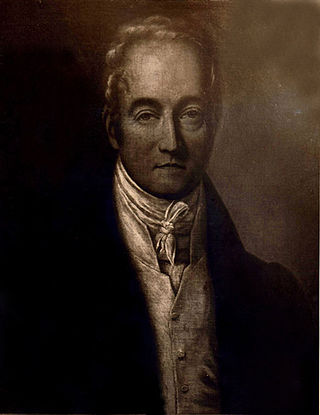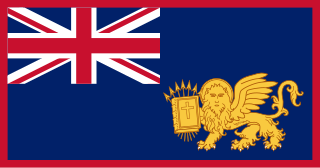
The Dean Cemetery is a historically important Victorian cemetery north of the Dean Village, west of Edinburgh city centre, in Scotland. It lies between Queensferry Road and the Water of Leith, bounded on its east side by Dean Path and on its west by the Dean Gallery. A 20th-century extension lies detached from the main cemetery to the north of Ravelston Terrace. The main cemetery is accessible through the main gate on its east side, through a "grace and favour" access door from the grounds of Dean Gallery and from Ravelston Terrace. The modern extension is only accessible at the junction of Dean Path and Queensferry Road.
A resident minister, or resident for short, is a government official required to take up permanent residence in another country. A representative of his government, he officially has diplomatic functions which are often seen as a form of indirect rule.

General Sir Frederick Adam was a Scottish major-general at the Battle of Waterloo, in command of the 3rd (Light) Brigade. He was the fourth son of William Adam of Blair Adam and his wife Eleanora, the daughter of Charles Elphinstone, 10th Lord Elphinstone. He was later a Lord High Commissioner of the Ionian Islands, who built Mon Repos, Corfu and other important landmarks in that Protectorate.
The July Stakes is a Group 2 flat horse race in Great Britain open to two-year-old colts and geldings. It is run on the July Course at Newmarket over a distance of 6 furlongs, and it is scheduled to take place each year in July.
James Campbell may refer to:

Patrick Fraser Tytler FRSE FSA (Scot) was a Scottish advocate and historian. He was described as the "Episcopalian historian of a Presbyterian country".

General Sir Howard Douglas, 3rd Baronet, was a British Army officer born in Gosport, England, the younger son of Admiral Sir Charles Douglas, and a descendant of the Earls of Morton. He was an English army general, author, colonial administrator and Member of Parliament for Liverpool.

William David Murray, 4th Earl of Mansfield, 3rd Earl of Mansfield, KT, DL was a British Conservative politician. Known as Lord Stormont from 1806-1840.

The United States of the Ionian Islands was a Greek state and amical protectorate of the United Kingdom between 1815 and 1864. The successor state of the Septinsular Republic, it covered the territory of the Ionian Islands, as well as the port of Parga on the Greek mainland. It was ceded by the British to Greece as a gift to the newly enthroned King George I, apart from Parga, which had been sold to Ali Pasha of Ioannina in 1819.

Sir John Robison KH FRSE FRSSA was a Scottish inventor and writer on scientific subjects. He was the son of the physicist and mathematician, Professor John Robison.

Sir Frederick Hankey was a British army officer, diplomat and colonial administrator. He was awarded the Grand Cross of the Order of St Michael and St George in 1833 by William IV. He served as a diplomat on Corfu and Malta.

Petros Vrailas Armenis was a Greek philosopher, liberal politician, and diplomat from Corfu (Kerkyra) in the Ionian Islands. He was politically active during the era of British rule, being elected president of the protectorate's Legislative Assembly. After the islands were ceded to the Kingdom of Greece in 1864, he became an MP for Corfu in the Hellenic Parliament and served as a Greek diplomat, including as Minister of Foreign Affairs.